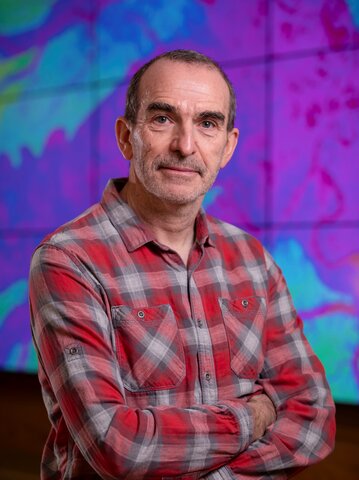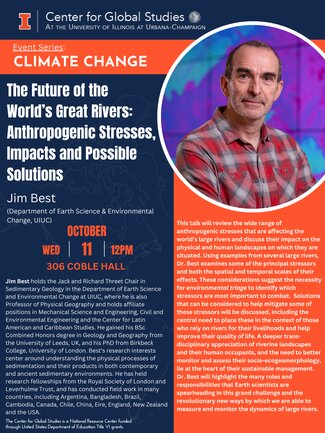
Please join the CGS for the next talk in our Climate Change series: Jim Best (Department of Earth Science & Environmental Change, UIUC) on Wednesday, October 11th at 12PM in 306 Coble Hall and on Zoom will give their lecture, "The Future of the World’s Great Rivers: Anthropogenic Stresses, Impacts and Possible Solutions."
This talk will review the wide range of anthropogenic stresses that are affecting the world’s large rivers and discuss their impact upon the physical and human landscapes on which they are situated. Using examples from several large rivers, the talk will examine some of the principal stressors, and both the spatial and temporal scales of their effects. These considerations suggest the necessity for ‘environmental triage’ to identify which stressors are most important to combat and over which timescales, and if multiple stressors must be tackled due to their interactions. Solutions that can be considered to help mitigate or ameliorate some of these stressors will be discussed, including the central need to place these in the context of those who rely on rivers for their livelihoods and helping improve their quality of life. A deeper trans-disciplinary appreciation of riverine landscapes and their human occupants, and the need to better monitor and assess their socio-ecogeomorphology, lie at the heart of their sustainable management. The talk will highlight the many roles and responsibilities that Earth scientists are spearheading in this grand challenge, and the revolutionary new ways by which we are able to measure and monitor the dynamics of large rivers.
Webinar Recording:
Jim Best holds the Jack and Richard Threet Chair in Sedimentary Geology in the Department of Earth Science and Environmental Change at the University of Illinois at Urbana-Champaign, where he is also Professor of Physical Geography and holds affiliate positions in Mechanical Science and Engineering, Civil and Environmental Engineering and the Center for Latin American and Caribbean Studies. He gained his BSc Combined Honors degree in Geology and Geography from the University of Leeds, UK, and his PhD from Birkbeck College, University of London. Best’s research interests center around understanding the physical processes of sedimentation and their products in both contemporary and ancient sedimentary environments. He has held research fellowships from the Royal Society of London and Leverhulme Trust, and has conducted field work in many countries, including Argentina, Bangladesh, Brazil, Cambodia, Canada, Chile, China, Eire, England, New Zealand and the USA.
